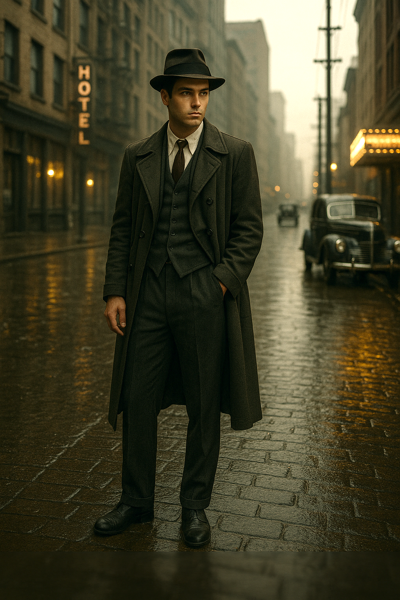
If you’ve ever read or written about a detective who insists on going it alone—gritty, cynical, fueled by bad coffee and sheer spite—you know the archetype. The classic lone wolf detective is practically married to their case files, allergic to vulnerability, and sometimes their only “friend” is a half-dead houseplant they forget to water.
And yet…here’s the thing. Even the most stubborn gumshoe or paranormal sleuth eventually needs people. Whether they want to admit it or not, they end up cobbling together their own version of family. That’s where found family dynamics come in—and honestly, they’re some of my favorite storytelling elements.
Why Lone Wolves Need a Pack (Even If They’d Rather Not Admit It)
The lone wolf detective archetype is built on solitude. Think Sam Spade in The Maltese Falcon or Jessica Jones in her dingy Hell’s Kitchen apartment. They’re prickly, they push people away, and they give serious “I don’t need anyone” energy. But as a reader, that can only take us so far. Watching a character endlessly brood in their office, chain-smoking in the dark? Atmospheric, sure. But after a while, you want to see what happens when someone barges into their life with too much enthusiasm and zero respect for boundaries.
Because here’s the secret: lone wolves shine brighter when contrasted with the people who refuse to let them be alone.
The Annoyingly Helpful Sidekick
One of the most common ways a found family develops is through the sidekick who simply refuses to leave. Watson is basically the original “ride or die” in detective fiction. Sherlock might roll his eyes at sentiment, but without Watson, the man would be lost in his own brain palace forever.
In urban fantasy, Harry Dresden has Karrin Murphy—a tough Chicago cop who tolerates his wizard nonsense while also saving his butt regularly. She’s not just backup; she keeps him tethered to humanity when he’s about two steps away from total magical burnout.
So yeah, your lone wolf might roll their eyes, but they secretly appreciate the one person who keeps showing up with coffee, first-aid supplies, or bail money.
The Unlikely Mentor (or Exasperated Parent Figure)
I adore the trope where the detective stumbles into someone who ends up being a reluctant mentor or older sibling figure. Picture Alfred with Batman—half butler, half emotional crutch, all sass. Or Giles in Buffy the Vampire Slayer—he’s the exasperated librarian who also happens to be the moral compass.
These characters add warmth and perspective. They don’t always approve of the detective’s methods, but they’re there when things get messy. And because the detective probably lost their real family or burned those bridges long ago, this stand-in figure scratches that “what if I wasn’t completely unlovable?” itch.
The Foundling (aka “Fine, I’ll Take Care of You”)
This one gets me every single time: the detective who swears they can’t be responsible for anyone…ends up with a stray. Maybe it’s an actual kid (The Mandalorian and Grogu, anyone?). Maybe it’s a young protégé who idolizes them, like Kate Bishop trailing Hawkeye around. Or maybe it’s a ghost, cat, or baby dragon that suddenly adopts them.
This dynamic does two things at once: it softens the hard edges of your lone wolf, and it creates instant stakes. They’re not just solving murders or chasing demons anymore—they’re protecting someone who depends on them. Cue reluctant dad/mom energy.
The Chaos Gremlin Friend
Sometimes the found family member isn’t supportive in the traditional sense—they’re the chaos agent. Think of Spike in Buffy or Dean’s buddy Crowley in Supernatural. They make questionable choices, cause trouble, and yet, when push comes to shove, they’re there.
For a detective, this could be the informant with sticky fingers, the hacker buddy who’s constantly on probation, or the flirtatious bartender who knows way too much about the city’s underworld. These characters bring levity, sass, and sometimes the exact morally gray skill set the detective needs.
Found Families in Queer Detective Fiction
Since I read (and write) a lot of queer detective stories, I notice how often found family plays a starring role. LGBTQ+ characters, historically, haven’t always had supportive birth families. So in fiction, found families aren’t just fun—they’re essential.
Take Alexis Hall’s Boyfriend Material: while it’s a rom-com, not detective noir, Luc’s group of chaotic friends is a perfect example of a queer found family propping up someone who insists they’re unworthy. In urban fantasy, Seanan McGuire’s October Daye series surrounds Toby with a whole crew who become her chosen family—even though she started as the classic reluctant loner.
For a queer detective character, found family isn’t just about breaking down walls—it’s about survival. It gives them a support system that validates who they are and makes them stronger against external threats.
How to Write It Without Making It Cheesy
Here’s my personal rule of thumb: your lone wolf should fight against the found family at first. They should roll their eyes, shove people away, insist they don’t need anyone. If they embrace a group right away, it loses that delicious tension.
But as the story progresses, let the cracks show. The detective’s mentor gives them a knowing look, the chaos gremlin drags them to karaoke night, the sidekick patches up their wounds while muttering “why do I put up with you?”—and suddenly, the lone wolf isn’t as alone as they thought.
It’s not about creating a Hallmark family where everyone hugs it out. It’s about small, sharp moments of connection that sneak in and stick.
So, yeah…
A lone wolf detective without a found family risks being one-note. Add in a ragtag support network, and suddenly you’ve got emotional depth, banter, and stakes that cut closer to the bone.
So give your grumpy sleuth their Watson, their chaos gremlin, their stray kid or cat. Let them find family in the unlikeliest places. Because honestly, no one should have to solve murders—or fight demons—alone.
What about you—do you have a favorite found family group in detective or urban fantasy stories? I’d love to hear who sticks with you!

When the dead start whispering your name, life gets complicated fast. Nick Michelson’s story begins here. Nick’s Awakening – grab your copy HERE.
